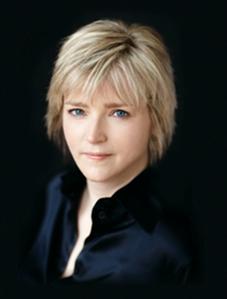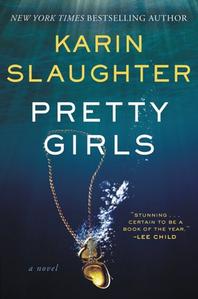
|
|
| photo: Alison Rosa | |
There are 35 million copies of Karin Slaughter's books in print worldwide, including her popular Atlanta/Will Trent and Grant County/Sara Linton series. Her first standalone, Cop Town (2014), was a New York Times bestseller and Edgar Award nominee for best novel.
Here she discusses her second standalone, Pretty Girls (reviewed below); having a public discourse on violence; and her love for libraries and her home state of Georgia.
Your books are so dark, they could make Darth Vader cry. How do you go to the dark side and stay sane and retain your sense of humor?
Well, I'm not so sure I'd call them dark. I think that because readers care about the characters, they feel more deeply what happens to them. Especially in Pretty Girls, where you've got these heartbreaking letters from Sam, it just heightens the emotional connection--which I think is a good thing! But you are right about humor, because that's how you keep the balance. You can't just have unrelenting darkness. You have to have some light in there, and you have to have some relief.
You've said you write about extreme violence to start a public dialogue about why it's happening. What have you learned on that front in the years since you were first published?
I've learned that you have to be very careful when you talk about what women go through every single day, because suddenly you're not just talking about women's experiences; you're being political. Some women say, "Meh, sexual harassment, so what? You just deal with it and move on." Others go immediately to the extreme--"You're being too hard on men! Not all men are awful!" That's a very effective way to shut down the conversation, to extrapolate one statement about one type of guy to the rest of mankind.
No one says to Chelsea Cain: "You write stories about a female serial killer torturing and killing men. Why do you hate women so much? Why do you think all women are manipulative and horrible?" Society is hardwired to question people who question the status quo. So I think you have to get past this crap before you can talk about issues, and you have to find a way to make sure that saying one man is a jerk doesn't mean you are saying all men are jerks, and that, honestly, we need men to help us with the jerks because they are getting away with terrible things.
 Pretty Girls is told from the points of view of three characters: Claire, Lydia and their father, Sam. Whose was easiest to write?
Pretty Girls is told from the points of view of three characters: Claire, Lydia and their father, Sam. Whose was easiest to write?
It depends on which day you ask me! Sam was probably the easiest because those letters just flowed. I know my dad pretty well, and he's a wonderful father and I think that while he would not articulate his thoughts the way Sam does, he would absolutely share those feelings (and honestly, my dad would shoot first and ask questions later if anything happened to any of his daughters).
I like Claire because she's the youngest, and I'm the youngest, so of course everyone should love Claire most. I like Lydia because she's very self-aware. As a woman of a certain age, her cracks about her age and weight ring true to me.
You are one of three girls, like the Carroll sisters. How much did you base them on your sisters? Have they read Pretty Girls?
They can get it at the bookstore. Ha! They haven't read it yet. Writing has always been a very private thing for me and it's not something I talk about with people I'm close with until it's on the shelves.
As far as basing the interactions in the book on my own experiences, I think we were much more violent than the Carroll sisters. There were lots of slap fights and Indian burns and holding each other down and drooling into eyes. Boys have such a bad reputation for being rough, but folks would be shocked to see what girls--especially teenage girls!--are capable of.
Compare for us writing a standalone and writing a series book.
When I write a Will Trent and Sara Linton book, I have a shorthand with the characters because I've known them for so long, and the challenge is more toward finding something new to say about them in a believable way. For instance, Will can't suddenly reveal he's been doing Civil War reenactments all this time.
With something like Pretty Girls, I have to think about the characters for a while and let my brain get to know them. The thing about this story in particular is that there are no cops narrating the story. When you write from a cop's perspective, you can have him or her interview witnesses, look at forensics, track down leads. Civilians can't legitimately do any of that, so I had to find ways for Lydia and Claire to be investigators without having them sound like "two feisty gals solvin' a crime!"
Ever consider writing a book set outside Georgia?
I might write a short story outside of Georgia eventually, but all stories are organic to place. Even Bradbury's Mars had shades of Waukegan. I love my state, I love Atlanta, and I feel like I am an ambassador for the region. There are a lot of misconceptions about the South that I feel need to be righted. And on a very real level, I get annoyed when outsiders fly in, spend a few days here, and think they can talk about the city as an insider. It never, ever rings true.
You're an advocate for libraries, and a leader of the Save the Libraries campaign. What's one of your favorite childhood library experiences?
I can't pin down just one experience, but I have this great memory of just sitting in the back of the library on the floor with a book opened in my lap and feeling an indescribable amount of peace.
Oh, I've had that feeling. It's the best.
Your first manuscript was rejected multiple times. Have you met the editors who sent those rejection letters since you became an international success? If yes, how did those encounters go?
Holy crap, I can't even remember their names! I'm sure I've met some and I just didn't remember. I am really, really bad with names. This makes it incredibly difficult for me to hold a grudge. Sometimes I'll meet someone I don't like and I've forgotten I don't like them, then I'll talk to them for a while and think, "Oh, right, I don't like you, and now I remember why."
But you know what? If I met those editors and remembered them, I would probably thank them, because those rejections made me change direction and write thrillers. That's where I found my voice, and while I don't remember their names, I remember their advice: write what you are passionate about. They were right. --Elyse Dinh-McCrillis, blogger at Pop Culture Nerd

